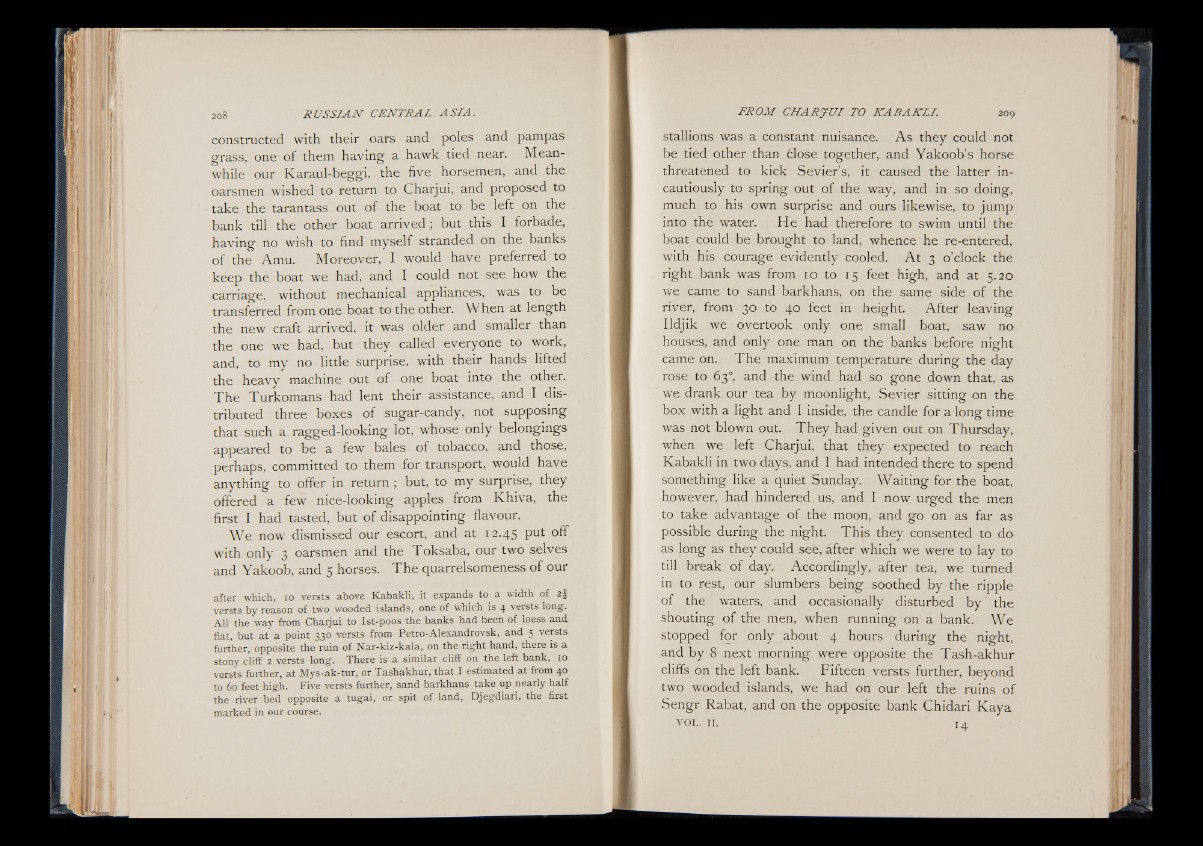
constructed with their oars and poles and pampas
grass, one of them having a hawk tied near. Meanwhile
our Karaul-beggi, the five horsemen, and the
oarsmen wished to return to Charjui, and proposed to
take the tarantass out of the boat to be left on the
bank till the other boat arrived ; but this I forbade,
having no wish to find myself stranded on the banks
of the Amu. Moreover, I would have preferred to
keep the boat we had, and I could not see how the
carriage, without mechanical appliances, was to be
transferred from one boat to the other. When at length
the new craft arrived, it was older and smaller than
the one we had, but they called everyone to work,
and, to my no little surprise, with their hands lifted
the heavy machine out of one boat into the other.
T he Turkomans had lent their assistance, and I distributed
three boxes of sugar-candy, not supposing
that such a ragged-looking lot, whose only belongings
appeared to be a few bales of tobacco, and those,
perhaps, committed to them for transport, would have
anything to offer in return ; but, to my surprise, they
offered a few nice-looking apples from Khiva, the
first I had tasted, but of disappointing flavour.
We now dismissed our escort, and at 12.45 put off
with only 3 oarsmen and the Toksaba, our two selves
and Yakoob, and 5 horses. T h e quarrelsomeness of our
after which, 10 versts above Kabakli, it expands to a width of 2%
versts by reason of two wooded islands, one of which is 4 versts long.
All the way from Chaijui to Ist-poos the hanks had been of loess and
flat, but at a point 330 versts from Petro-Alexandrovsk, and 5 versts
further, opposite the ruin of Nar-kiz-kala, on the right hand, there is a
stony cliff 2 versts long. There is a similar cliff on the left bank, 10
versts further, at ]VIys-ak-tur, or Tashakhur, that I estimated at from 40
to 60 feet high. Five versts further, sand barkhans take up nearly half
the river bed opposite a tugai, or spit of land, Djegdiari, the first
marked in our course.
stallions was a constant nuisance. As they could not
be tied other than 6lose together, and Yakoob’s horse
threatened to kick Sevier’s, it caused the latter incautiously
to spring out of the way, and in so doing,
much to his own surprise and ours likewise, to jump
into the water. He had therefore to swim until the
boat could be brought to land, whence he re-entered,
with his courage evidently cooled. A t 3 o’clock the
right bank was from 10 to 15 feet high, and at 5.20
we came to sand barkhans, on the same side of the
river, from 30 to 40 feet in height. After leaving
Ildjik we overtook only one small boat, saw no
houses, and only one man on the banks before night
came on. T h e maximum temperature during the day
rose to 63° and -the wind had so gone down that, as
we drank our tea by moonlight, Sevier sitting on the
box with a light and I inside, the candle for a long time
was not blown out. They had given out on Thursday,
when we left Charjui, that they expected to reach
Kabakli in two days, and I had intended there to spend
something like a quiet Sunday. Waiting for the boat,
however, had hindered us, and I now urged the men
to take advantage of the moon, and go on as far as
possible during the night. This they consented to do
as long as they could see, after which we were to lay to
till break of day. Accordingly, after tea, we turned
in to rest, our slumbers being soothed by the ripple
of the waters, and occasionally disturbed by the
shouting o f tire men, when running on a bank. We
stopped for only about 4 hours during the night,
and by 8 next morning were opposite the Tash-akhur
cliffs on the left bank. Fifteen versts further, beyond
two wooded islands, we had on our left the ruins o f
Sengr Rabat, and on the opposite bank Chidari Kaya
v o l . 11. 14